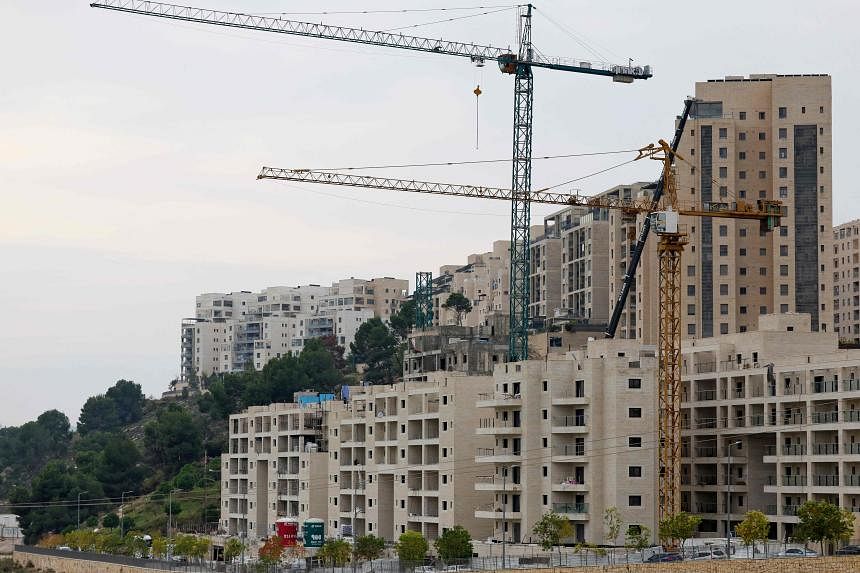NEW DELHI – Israel has turned to India and Sri Lanka in its search for much-needed workers to revive its largely comatose construction industry, after the country deported thousands of Palestinian workers and revoked their work permits following Hamas’ Oct 7 attack on it.
Around 82,000 Palestinians worked in the country’s construction industry prior to the assault, accounting for a third of the sector’s workforce.
Left without these workers – as well as another 2,000 from China and Eastern Europe who returned home after Oct 7 – construction sites across Israel have gone quiet, significantly denting the country’s economy. The labour shortage has been exacerbated by the mobilisation of hundreds of thousands of Israeli reservists for the war against Hamas.
The Israel Builders Association (IBA) estimates that the industry, one of the country’s biggest economic sectors with a market size valued at US$71 billion (S$94 billion) in 2022, has been operating at just 15 per cent of its pre-war capacity.
This has brought urgency to the recruitment of fresh foreign workers, and representatives from IBA will be in India and Sri Lanka next week to screen applicants for various roles such as plastering, ceramic tiling, building formwork and iron bending.
“The goal is bringing 10,000 (workers) very quickly to Israel because time is running (out) and we are already in a big, big problem financially,” Mr Shay Pauzner, IBA’s deputy director-general, told The Straits Times on the phone from Tel Aviv.
These workers are expected to be in Israel by the end of January, as “we are working very fast because the situation is very, very dire”, he added.
They are part of a batch of 30,000 new workers that the Israeli government has allowed the IBA to recruit from different countries.
On Dec 15, the Haryana Kaushal Rozgar Nigam, a government recruitment agency in the Indian state of Haryana, put out an advertisement calling for construction workers for Israel.
It did so after the Indian government’s National Skill Development Corporation wrote to the state on Nov 25 about a requirement for 10,000 construction workers in Israel, citing it as an example of its “strategic engagements” with foreign governments to enhance international workforce mobility for Indians.
A spokesperson for the recruitment agency said it had received applications from 2,994 candidates as at Dec 20, which was the last day to send in applications.
At least two other Indian states, Uttarakhand and Uttar Pradesh, have also begun preliminary work to select potential construction workers for Israel.
Israel’s construction and agricultural sectors have been heavily reliant on foreign, including Palestinian, workers. Around 150,000 Palestinians from the West Bank and an additional 17,000 from the Gaza Strip had permits to enter Israel legally for work.
Mr Pauzner said the construction industry needs an estimated 100,000 workers to return to its pre-war capacity. “The picture is very bad right now. About 75 per cent of the building sites are working at a very slow pace and at around 40 per cent to 50 per cent of them, there is either no work at all or very little work,” he added.
The Times of Israel reported on Dec 20 that the authorities announced the arrival of more than 12,000 new and veteran foreign workers. They include more than 1,000 Thai and 100 Sri Lankan workers for the agricultural sector.
In November, Sri Lanka forged an agreement with Israel to allow the immediate hiring of 10,000 Sri Lankan farm workers.
On Dec 19, during a telephone conversation with his Indian counterpart Narendra Modi, Israeli Prime Minister Benjamin Netanyahu also “discussed advancing the arrival of foreign workers from India to the State of Israel”.
In May, Israel and India inked an agreement to allow 42,000 Indian workers to work in the Jewish state. A statement released by the Israeli Foreign Ministry then said 34,000 workers would be engaged in the construction field and another 8,000 for nursing needs.
The move to send Indian workers to Israel, however, has not gone down well in some sections, with concerns over their safety as well as the impact it could have on the Palestinian workers they replace.
While the Indian government has put out an advisory for Indians in Israel asking them to “remain vigilant, and observe safety protocols”, it has not banned the employment of Indians in the country. Of the estimated 18,000 Indian nationals who were in Israel prior to the attack – many of them nurses – only around 1,300 chose to return.
An Indian Ministry of External Affairs spokesperson told the media on Dec 21 that India has had “no discussions with Israel regarding possible replacement of Palestinian labourers with Indian workers”.
The Construction Workers Federation of India (CWFI), affiliated to one of India’s biggest trade unions, has opposed the recruitment of Indian workers for Israel. “This is a sinister ploy to exploit our country’s poor construction workers to send to Israel by offering lucrative salary at the expense of death, starvation and income losses of fellow Palestinian workers,” it said in a statement on Dec 19.
Its national president, Ms K. Hemalata, told ST that these Indian workers could become “tools in the hands of Israel” to further its war efforts against Palestine.
“They could be used to build their military-related infrastructure, construct illegal settlements or as manual labourers to advance their war attempts in other different ways,” she said.
CWFI-affiliated unions will hold district-level campaigns against this recruitment through next week, during which it will distribute leaflets among construction workers to raise awareness about the ongoing conflict. The federation has called for an immediate ceasefire and backed a two-state solution with a Palestinian state along the lines of its 1967 borders, with East Jerusalem as its capital.
British human rights group FairSquare has also urged India not to send its citizens to Israel to replace deported Palestinian workers, saying it would be a “craven green light for war crimes”.
But such appeals are unlikely to deter those who may be attracted by the relatively high salary on offer. Compared with the 6,100 Israeli new shekels (S$2,240) that has been advertised for the workers as their monthly pay, construction workers targeted for this recruitment in India earn around a fifth of what has been promised.
Dr S. Irudaya Rajan, chair of the International Institute of Migration and Development in Thiruvananthapuram in the southern Indian state of Kerala, said that as long as the workers are paid properly and their rights protected, those interested should be allowed to go.
“India has a huge demographic dividend... If some people can go and benefit, their families will benefit, the next generation will have a good house, their children will go to better schools – these are all important impacts of migration,” Dr Rajan told ST.
“But recruiting agents should brief them before their departure about the current situation in Israel, so that the workers are able to make an informed decision,” he added.


